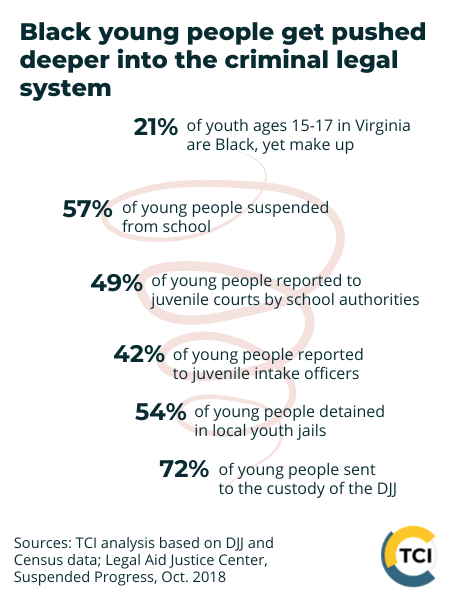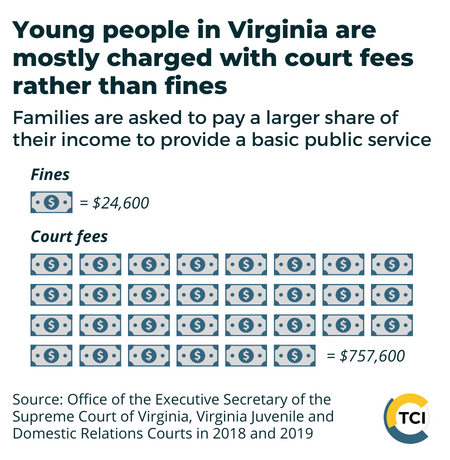July 5, 2022
Extended Injustice: Court Fines and Fees for Young People are Counterproductive, Particularly Harm Black Young People, Families, and Communities

Virginia can be a place where every young person has the support and resources to reach their full potential and where young people who get into trouble are helped to get back on the right track. Unfortunately, currently in Virginia, the youth court system frequently imposes fines and fees on troubled young people and their families, placing additional barriers in their path. This creates long-standing harm for children who enter the system and their families, with Black teenagers most often being swept into the youth criminal legal system and therefore facing the greatest financial and family harms. Analyses of these economic and social impacts of fines and fees on Black and Brown teenagers highlight the pressing challenges these children and their families can face and offer alternative measures that could better help youth who encounter the juvenile justice system.
Court Costs Fall Most Heavily on Black Families and Have Long-Term Harms
Virginia’s youth court system pushes Black young people deeper into the system, and as a result, levying fines and fees on young people in the youth court system particularly harms Black young people, families, and communities. With high exposure to trauma and insufficient funding for school-based supports such as school counselors, plus racial bias that leads to Black youth being seen as more threatening than white youth, too many young Black Virginians end up getting pushed out of school and into contact with law enforcement. And law enforcement officers referred Black young people to the juvenile justice system at 2.6 times the rate of white young people according to a recent Joint Legislative Audit and Review Commission (JLARC) study.

The frequent referral of Black young people to the juvenile justice system is a part of a vicious cycle that fails to provide sufficient school-based support to Black teens, instead relying on school suspensions and referrals to law enforcement, too often pushing young people deeper into the criminal legal system. Black youth make up 21% of Virginia teens age 15 to 17, yet, they account for more than twice that share of young people who are suspended from school (57%), reported to juvenile courts by the schools (49%), reported for juvenile intake (42%), detained in local youth jails (54%), and held in the custody of the Department of Juvenile Justice (DJJ) (72%), according to 2019 research.
Research shows that the juvenile justice system has a harmful economic and social impact on Black youth. In Virginia, fines and fees are assessed at the highest rates by the courts serving localities with the highest share of Black residents and residents with incomes below the poverty line. While detailed Virginia data on the impact of juvenile court fines and fees by race is not available, analyses from other states shows that Black youth pay the highest amount in fines as a result of greater frequency and duration of average probation conditions. The high cost of these fines and fees can financially harm a family and alter family dynamics. The financial burden forces families with low incomes to choose between paying for necessities and paying fees. It can also heighten tensions within already strained familial relationships and fuel feelings of anger and resentment. And with Virginia’s 30- and 60-year statutes of limitations on court debt, these costs can follow young people for a lifetime. Fines and fees are also counterproductive, undermining public safety by placing people in vulnerable situations. With mounting court fees and interest steadily accruing, people are left with few options to come up with money for these rising costs.
It is important to note that most court assessments charged to young people in Virginia are not fines meant to discourage or “punish” harmful behavior, but instead court fees meant to cover costs for operating Virginia’s court system.

There was just $24,600 in fines, compared to $757,600 in costs, imposed and collected in delinquency cases in Virginia Juvenile and Domestic Relations Courts in 2018 and 2019, according to data provided by the Office of the Executive Secretary (OES) of the Supreme Court of Virginia. This means that young people, disproportionately Black and from low-income communities, are being asked to pay a disproportionate share of their income for the provision of a basic public service such a court system. This is a regressive approach to funding public services, asking more of those who have less.
The impacts are not only felt by the youth and their families, but they can also be felt by the very government imposing these fees. Fines and fees are, and always have been, inefficient sources of revenue. Overall fines and forfeitures are also a relatively insignificant revenue source for Virginia’s local communities, typically making up less than 0.5% of county and city revenue. Out of the state’s 133 localities, only five receive more than 2% of their total revenues from fines and forfeitures. Since fines and fees collected from young people in the juvenile system are a small share of overall statewide fines and fees, the local revenue impact of ending youth fines and fees would be even smaller.
Reforms in Virginia and Beyond
Virginia has taken several steps in recent years to respond to the counterproductive impacts of fines and fees. Most significantly, Virginia has stopped suspending driver’s licenses due to unpaid fines and fees. Additionally, during the 2021 special session I, the Virginia legislature passed House Bill (HB) 1895, which removed the requirement of a down payment for a payment plan; removed the requirement of being unable to pay fines for 30 days for deferment eligibility; and amended interest accrual from 40 days after final judgment or incarceration to 180 days. Additionally, the legislature passed HB 1912, which ended the practice of charging the parents of incarcerated youth “pay to stay” fees.

One of the most significant reforms Virginia has made is to stop suspending driver’s license due to unpaid fines and fees. The practice was a clear example of how fines and fees often trap people into cycles of poverty and keep them tethered to the criminal legal system.
Additionally, in recognition of the impact of the pandemic on people’s ability to pay fines and fees, beginning in March 2020, the Virginia Supreme Court issued and has since extended a Judicial Emergency Order that provides that “all applicable deadlines, time schedules and filing requirements, including any applicable statute of limitations which would otherwise run during the period this order is in effect, are hereby tolled and extended.” The initial Order included the suspension of interest on court fines and fees and paused accounts being sent to collections. While other components of the Order have been extended over 30 times in the last two years, the fines and fees portion has not, with the moratorium ending in July of 2020. Considering the economic impact of the pandemic on low-income and Black and Latinx families, this Order likely provided much-needed relief for those most targeted by fines and fees.
Virginia has also taken some steps to move to a smarter, more modern approach to the juvenile justice system more broadly. The Department of Juvenile Justice began a transformation in 2016, after the General Assembly directed the Department to create a plan that would improve the effectiveness and efficiency of the juvenile justice system. The plan aimed to increase local placement and community-based programs, ensure rehabilitative programs that were effective in meeting needs and risk reduction, and reduce the number of youth in state correctional facilities. These reforms have resulted in a reduction in extremely lengthy stays in the state’s youth prison, which are counterproductive and actually increase recidivism, and some young people are now kept closer to their homes in local youth jails rather than the centralized state youth prison.
Across the country, states and municipalities have begun implementing programs and legislation that promote fines and fees justice. In the past few years, 15 states and many localities have passed legislation abolishing fees and fines. This includes states like Texas and Louisiana, which have passed comprehensive fee and fine abolition bills. In New Orleans, the Orleans Parish Juvenile Court eliminated fees for youth and families of youth in the juvenile justice system. The Philadelphia Department of Human Services and Dane County, Wisconsin Board of Supervisors both ended child support collection from parents of incarcerated youth.

Even in Virginia, localities are leading the way in the fight for alternative sanctions, showing that charging fines and fees is not a necessary component of the criminal legal system. The Albemarle-Charlottesville Community Service Program allows people to perform community service to pay off fines and fees, even while currently incarcerated. Wise County implemented the Wise Works Program as a community service alternative to jail time for people who have committed less serious offenses. Current Virginia law offers community service in lieu of fines and fees, however this does not pertain to repayment of restitution, interest on restitution, or collection of restitution. Numerous state-based policy organizations are pursuing research and educating policymakers on the negative and regressive ways fines and fees impact people in Virginia.
1912
House bill during 2021 special session that ended charging the parents of incarcerated youth “pay to stay” fees
15
Number of states that have passed legislation to abolish fines and fees. Many localities have also passed legislation
10+
Number of fines and fees policy recommendations included in JLARC’s 2021 Commission report
Legislators can enact policies that further these forward-thinking approaches to juvenile fines and fees justice. JLARC’s 2021 Commission report on Virginia’s juvenile justice system included over 10 different policy options Virginia’s General Assembly should consider. A recommendation such as a state-operated system of juvenile public defenders can go a long way in providing adequate legal services to youth across the state who are less likely to have the resources to provide their own attorney. Additionally, Virginia could remove the fees charged to families of young people who receive court-appointed attorneys, as was proposed during the 2022 legislative session. Lawmakers should also enact legislation aimed at lowering the statute of limitations for court debt so that debt does not follow people for decades who are trying to rebuild their lives. This would help more people in Virginia escape poverty and have greater economic opportunity. Furthermore, Virginia could follow the example of the many states around the country that have passed comprehensive fee and fine abolition, recognizing that fees and fines don’t work for young people, don’t bring in significant revenue, and don’t support public safety. Reforms such as these would help provide fair and constitutional judicial proceedings as required by the Constitution of Virginia, a requirement that too often is not met for a significant portion of the commonwealth’s population: Black young people.
ACTION IS NEEDED TO MAKE SURE YOUNG PEOPLE ARE CONNECTED TO THE SUPPORT AND RESOURCES NEEDED TO REACH THEIR FULL POTENTIAL.
Action is needed to make sure that the youth criminal legal system connects young people — no matter what they look like or how much money their family has — to the support and resources needed to reach their full potential, rather than placing additional barriers in their path. Research shows how eliminating fines and fees can promote racial and economic justice. Virginia legislators have an opportunity to advance this work and provide meaningful justice for young people and communities.

